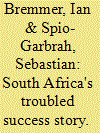| Srl | Item |
| 1 |
ID:
078568


|
|
|
|
|
| Publication |
2007.
|
| Summary/Abstract |
Black Economic Empowerment (BEE) is an attempt to marry redistributive and neo-liberal economic policies. The South African state, however, has differing degrees of power to force redistribution on different sectors of the economy. Fisheries is one of the sectors where state allocation of licenses, exploitation rights and quotas makes the prospects for BEE promising. In this article, we examine redistributive processes in the hake trawl industry. We conclude that BEE, despite its redistributive intentions, has been doubly conducive to the interests of large-scale South African capital. To begin with, it has by and large confirmed the historical share of fishing rights to incumbent, largely white-controlled, operators. Second, it has created a layer of 'black captains of industry' to whom incumbents are increasingly outsourcing primary production in a volatile, high-risk and currently loss-leading sector. While fishing operations are being outsourced under the banner of redistribution, the fish trade remains under the effective control of white capital.
|
|
|
|
|
|
|
|
|
|
|
|
|
|
|
|
| 2 |
ID:
092823


|
|
|
|
|
| Publication |
2009.
|
| Summary/Abstract |
Three levels of analysis are used to track the channels by which South Africa and its people are impacted by an increase of oil prices, namely the macro-economic level, the meso-economic level and the micro-economic/household level. The paper uses an economy and energy integrated approach to quantify these different channels. The approach combines a household survey dataset and an input-output dataset to implement the models. Results indicate that the impacts on the macroeconomy are negative, with gross domestic product falling and the current account balance worsening. All of the industries falling into the high intensive oil - use group witness an increase of their input cost that is above the economy - wide average. The impact of doubling paraffin prices results in poor households in rural areas and among the "Black" population, in particular, witnessing an increase of their cost of living which is much higher than their corresponding highest expenditure quintile groups. An increase of transport fuel hits the richer households much harder. The distributional impacts of rising transport cost as a consequence of high oil and oil-products prices shows that median quintile expenditure groups observe the highest impact both in urban and rural areas and especially among the "Black" population.
|
|
|
|
|
|
|
|
|
|
|
|
|
|
|
|
| 3 |
ID:
077357


|
|
|